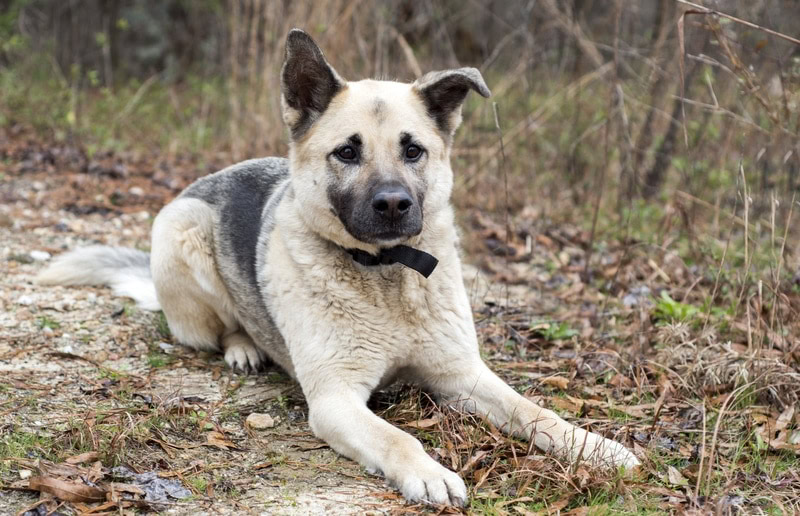Akita Dog Breed Info: Pictures, Characteristics & Facts

Updated on
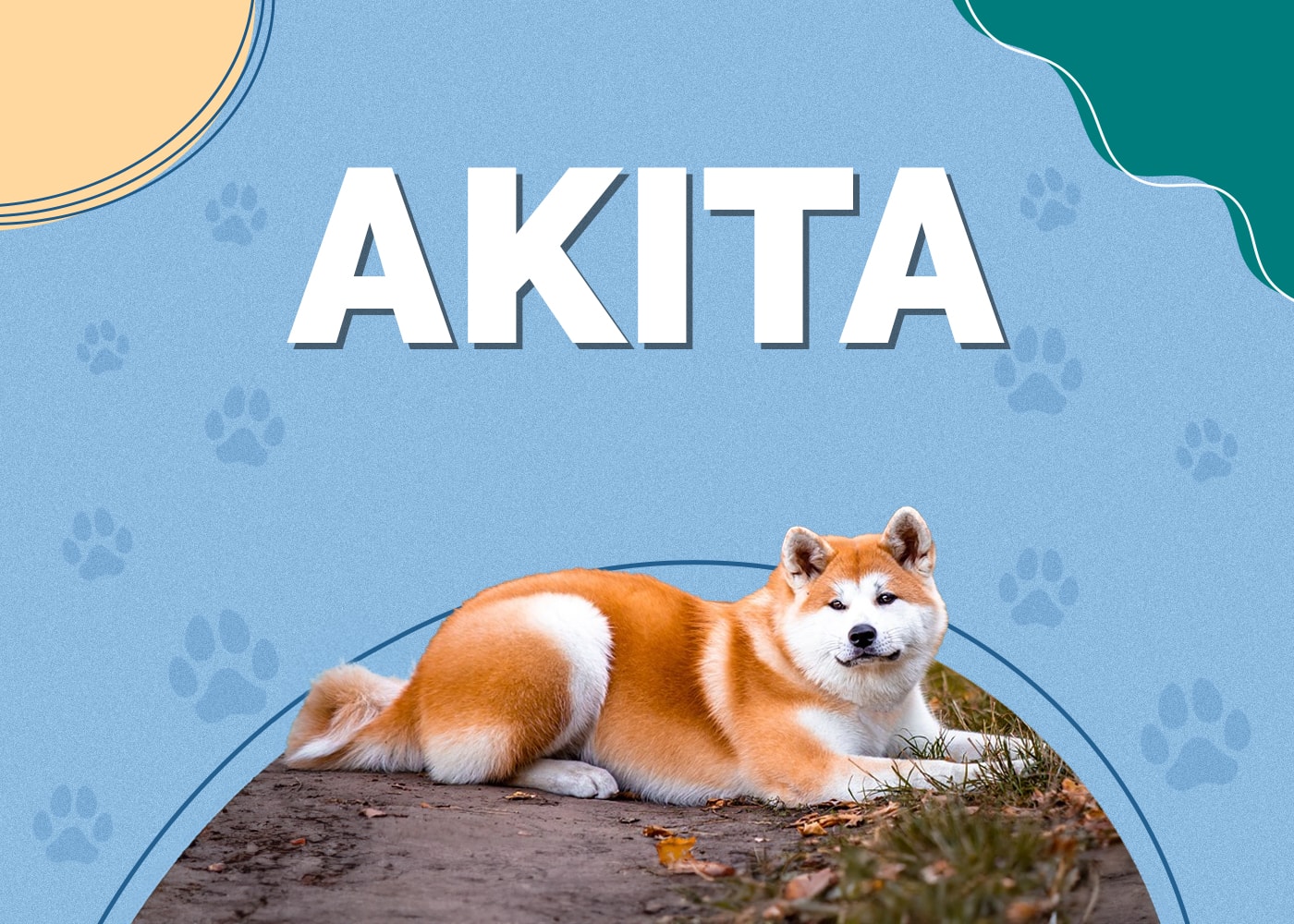
| Height: | 24 – 28 inches |
| Weight: | 70 – 130 pounds |
| Lifespan: | 10 – 13 years |
| Colors: | Silver, fawn, black, brown, red, white, brindle |
| Suitable for: | Families without small children, those looking for an intensely devoted companion |
| Temperament: | Loyal, protective, energetic, aloof, territorial |
The Akita rose out of a violent past to become a loving and devoted pet. While these dogs will never win any awards for congeniality, they will defend their owners to the death—seriously, these dogs won’t even back down from a bear.
They’re a proud and stubborn breed and not ideal for first-time owners. They also fare much better in colder climates, so you might not want to bring one home if you live in Phoenix. If you can earn their respect and live in a suitable area, though, you’ll find them to be the most loving companions you could ever dream of.
Akitas are a fairly well-known breed, yet they still manage to be misunderstood by a large percentage of the population. If you’d like to learn more about these wonderful animals, the guide below will fill you in on all you need to know.
Akita Puppies
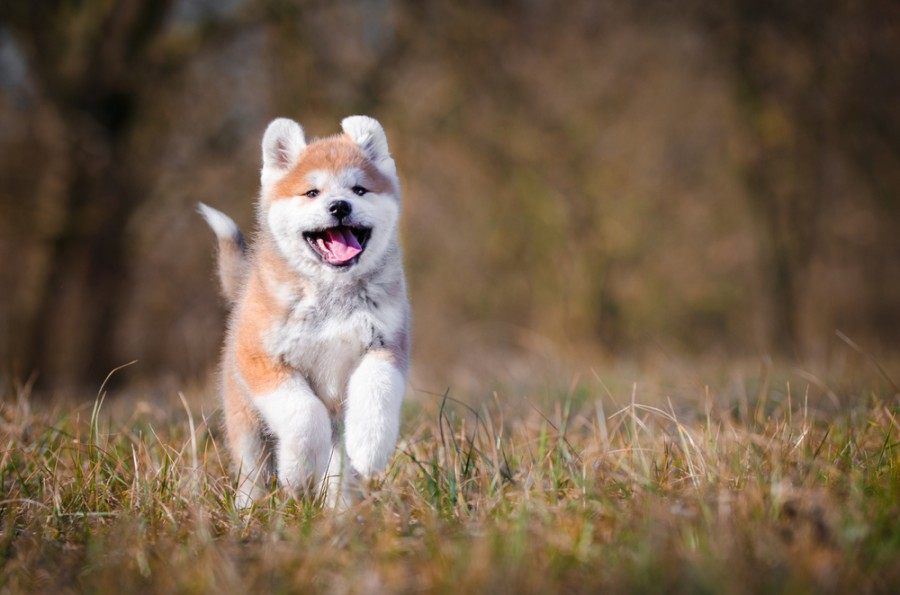
Akitas can be gorgeous, and you’ll never know love as strong and true as the one these dogs reserve for their chosen humans. However, no matter how much they love you, this is a challenging breed to raise.
They’re opinionated animals, and if they feel that you’re not up to the task of commanding them, they’ll make the training process as difficult as possible. As a result, they require a confident and firm owner who won’t tolerate being walked all over. They’re not satisfied with a lethargic lifestyle, either. If you’re not prepared to spend time exercising in nature with your dog, it might be better for both you and the Akita if you adopt another breed.
None of this is said to scare you away from bringing an Akita home, however. As we said, these dogs love intensely, and Akita owners experience some of the strongest bonds with their dogs that you’ll find anywhere. However, we’d be remiss if we didn’t prepare you for the realities of Akita ownership.
3 Little-Known Facts About the Akita
1. Akitas Don’t Really Bark, But That Doesn’t Mean They’re Quiet
You may be able to count the number of times that you ever hear your Akita bark on one hand. You might think this would make them good for apartment life, but that’s not necessarily true. These dogs are extremely vocal and love to talk to their owners as much as possible. They can engineer a wide range of sounds as well, including yips, mumbles, grumbles, and grunts.
Also, these dogs love to howl. If you like to sing in the shower, don’t be surprised if your Akita decides to provide backup vocals.
2. Don’t Try to See Eye-to-Eye with These Dogs
Many dog breeds will interpret direct eye contact as a sign of aggression, but the Akita is especially bad about it. As tempting as it may be to stare lovingly into their eyes, you should realize that they’ll be experiencing a much different emotion.
Don’t get right in their faces, either. While these dogs are incredibly loving toward their owners, they’re not exactly cuddle-bugs.
3. Don’t Outsource Your Training Unless You Absolutely Have To
While Akitas can be difficult to train, doing so represents an incredible bonding experience between you and your dog. If you outsource the job to someone else, don’t be surprised if your pup ends up more attached to your surrogate than to you.
If you can train your Akita with a calm and confident hand, the dog will learn to respect you—and at that point, it will go to the ends of the Earth for you.
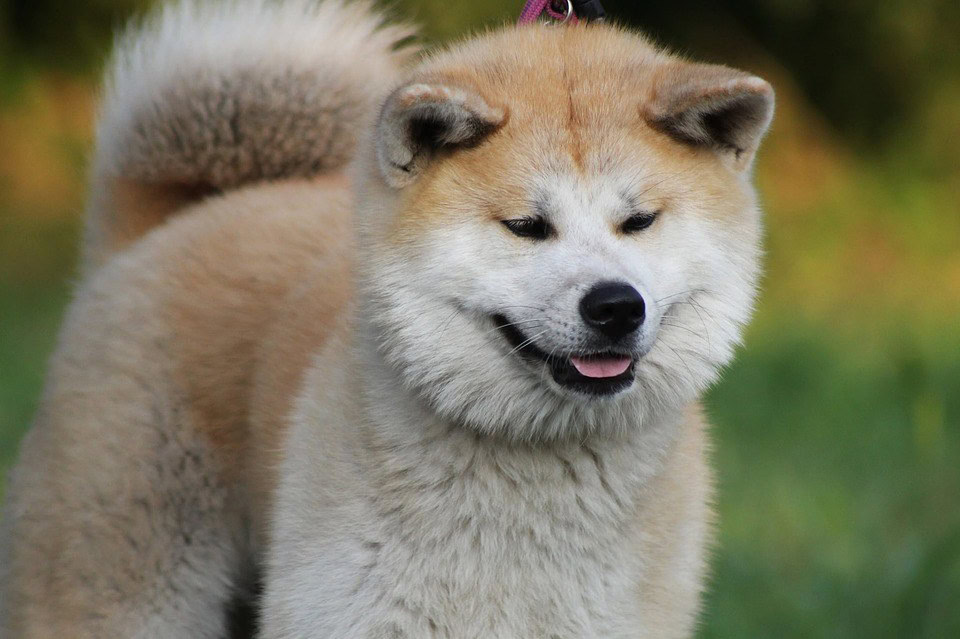
Temperament & Intelligence of the Akita 🧠
In many ways, Akitas behave more like cats than a typical dog. They’re not bouncy, slobbery balls of affection, but they show love in their own way. These dogs think that their families hung the moon—and they can’t be bothered to care about anyone else, quite frankly. They often view outsiders with suspicion, and their primary focus is on protecting their loved ones at all times.
They have a keen intelligence, and their brains seem to have two settings: hunt and protect. If they decide that you’re not in any immediate danger, they’ll most likely spend their time trying to track down prey to stalk—just like a cat would, in fact. They don’t come in barking and howling, hoping to run down their quarry; instead, they sneak up behind it silently before pouncing. This requires stealth and cunning, which are two of the key features of the Akita’s intelligence.
Basically, don’t adopt an Akita if you’re a fan of the traditional canine experience. Instead, they’re better suited for owners who always wanted a giant cat (but can’t afford a tiger).
Are These Dogs Good for Families? 🏡
It’s not a good idea to bring an Akita into a home with small children. They have little patience for the slapping, grabbing, groping, and general clumsiness that little kids are likely to subject them to.
Also, these dogs can be territorial, and resource guarding is common. Bad things can happen if a child accidentally wanders too close to an Akita’s food bowl at dinnertime. They don’t like to be teased either, which makes them poor playmates for children. If you do have little ones around an Akita, it’s extremely important to train both the kids and the dog in proper behavior around one another.
If you have older kids or an empty nest, though, an Akita can make a fantastic family pet. They love to spend time roaming around the Great Outdoors with their owners, and they will basically stick to your side like glue.
They’re incredible guard dogs as well. They only bark when something is really wrong, so you don’t have to worry about false alarms. Also, they’re one of the few dog breeds that will actually do something about an intruder, rather than just call for backup.
- Keep your dog stylish with one of these fetching Dog Bandanas
Does This Breed Get Along with Other Pets? 🐶 😽
Akitas were bred to be hunters and fighters, and neither instinct has ever fully left them. As a result, they’re not suitable for multi-pet households. Any smaller animal is in considerable danger of being hunted by the Akita. Since these dogs stalk and pounce like cats, they’re much more successful at hunting smaller prey than most other dog breeds, which is bad news indeed if you have a cat or a gerbil in the house.
They don’t much care for the company of other dogs either. If you absolutely must get them a canine playmate, make sure it’s of the opposite sex, as they’re extremely prone to same-sex aggression.
Some of these traits can be tempered by spaying or neutering the Akita early on and socializing them religiously, but you may never be able to leave them alone with another animal without fear of what might happen while you’re gone.
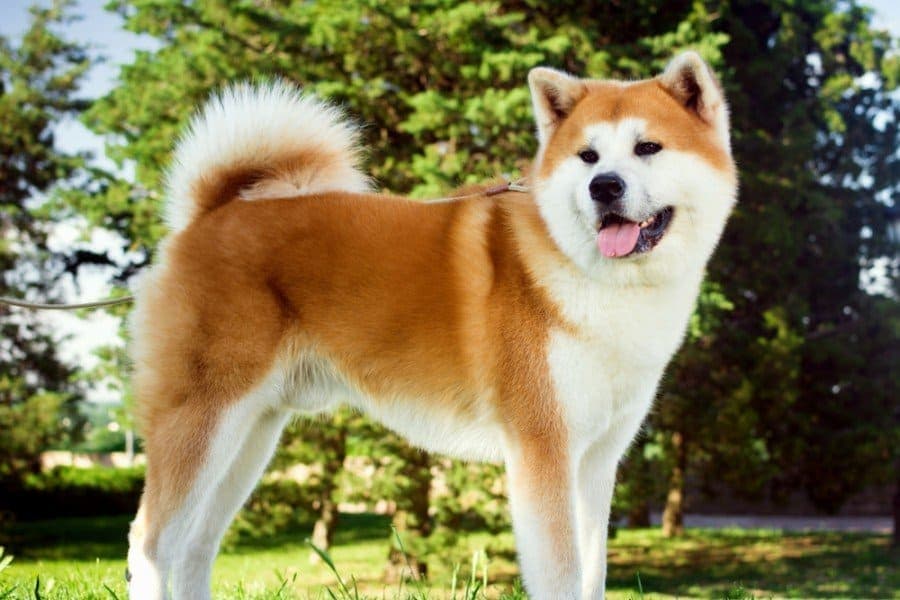
Things to Know When Owning an Akita
Akitas aren’t an easy dog to own, and they may not be a good choice for novice owners. Regardless of your experience level, though, there are a few pertinent facts you should know about these dogs before bringing one into your home.
Food & Diet Requirements 🦴
Akitas are big and active, so they eat quite a bit. Expect to need to buy a new bag of kibble every couple of weeks. You shouldn’t skimp on quality either; these dogs do best with a high-protein diet, so avoid any carb-heavy food, especially if it uses cheap fillers like corn, wheat, or soy.
Be careful not to overfeed, though. Remember that these dogs were bred to withstand extreme cold, so it’s easy for them to pack on the pounds for winter. Control their portions, don’t allow free feeding, and be sure they get plenty of exercise.
You can use treats as rewards during training, but don’t go overboard. You can’t really buy an Akita’s respect, anyway, so you’re likely better off using praise instead.
Exercise 🐕
Exercise is not an option for Akitas. These dogs need a great deal of physical and mental stimulation, and if you don’t provide it, you’re likely to encounter all manner of negative behaviors. These pooches love to spend time in nature, so long hikes are always a good idea. Regular walks are important as well, but keep a brisk pace and expect to spend at least an hour a day exploring the neighborhood.
They especially enjoy playing in the snow, so if you live in an area prone to blizzards, be sure to take your pup out for cross-country skiing or other adventures. If you take your dog to the park, keep them on a tight leash. Akitas aren’t usually hospitable toward other dogs, and they love to terrorize smaller animals, which is a great way to earn you a trip from animal control.
Dog parks are typically out of the question as well. Akitas are more likely to defend the water bowl than form new friendships.
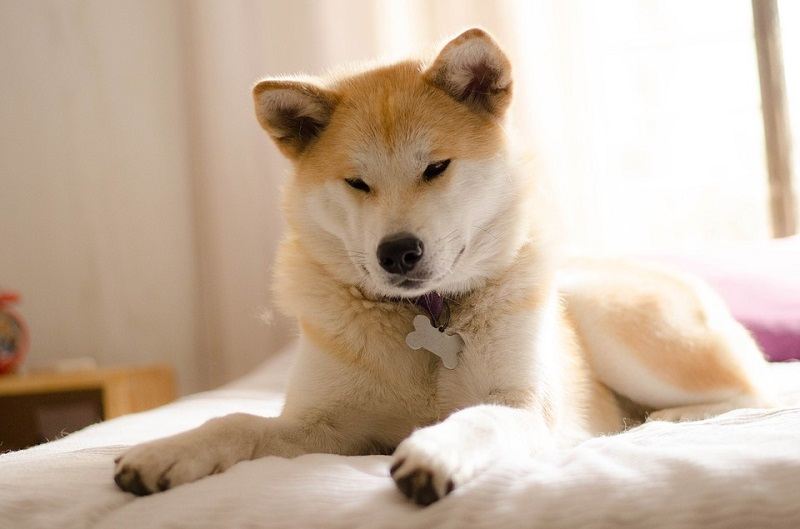
Training 🦮
If you’re going to bring an Akita into your life, you absolutely must spend a ton of time training it. These dogs aren’t naturally polite, so they’ll need you to teach them how to behave among company.
Akitas form powerful bonds with their trainers (assuming that the trainer knows what they’re doing, of course), so it’s in your best interest to handle it yourself. If you don’t think you’re up to the task, you’re better off going with a less demanding breed.
Group classes are generally ill-advised. You don’t want to spend the entire class trying to keep your dog from going after the other pups, especially if those animals are poorly behaved as well. Socialization needs to happen early and often. Even if you’re diligent about introducing your Akita to new people and places, don’t expect them to be an extrovert.
All in all, Akitas are difficult to train but training is unbelievably important. As a result, novice owners are often discouraged from owning them. However, if you think you can handle one, then you’ll enjoy all the fruits of their incredible friendship.
Grooming ✂️
When it comes to grooming, Akitas are a high-maintenance breed. The good news is that like cats, they’ll handle much of their own grooming. For much of the year, you should only need to brush them once a week or so.
However, there are a few times every year when Akitas just decide to take all their fur off. Their shedding can be incredible, so expect to get dog hair all over your home. You should provide them with plenty of shelter during the summer in order to try to minimize that shedding as much as possible.
These dogs tend to gobble their food down and are subject to bloat and other conditions, so you may need to take special precautions at feeding time. That may mean doling out the kibble a little bit at a time or even buying a special bowl. Just be careful, and don’t let them scarf their food down too quickly.
The rest of their grooming is fairly typical. Brush their teeth often, trim their nails as needed, and clean their ears out a few times a month. Pay attention to their eyes as well, as the breed tends to suffer from eye conditions.
Health and Conditions ❤️
Akitas are beautiful and powerful dogs, but they’re also susceptible to a wide range of conditions. If you own one, expect to spend a fair amount on vet’s bills over their lifespan.
The main things to worry about include:
- Sebaceous adenitis
- Pemphigus
- Eye infections
- Hip dysplasia
- Elbow dysplasia
- Bloat
- Thyroiditis
- Von Willebrand’s disease
- Progressive retinal atrophy
Male vs. Female
Male Akitas are typically considerably bigger than their female counterparts, although the females are still quite large. Expect a difference of a few inches and as much as 30 pounds.
As far as personality goes, females are less aggressive in general than males. Males are extremely territorial and tend to view any unknown person or animal as a threat.
Final Thoughts
Akitas are beautiful, intelligent, and loyal, but they’re certainly not easy. These dogs will challenge you in a variety of ways, so if you’re not confident in your ability to handle them, you’re better off adopting another breed.
Those who earn the Akita’s trust will enjoy a lifetime of closely bonded companionship, however. These dogs would gladly die for their owners; while we hope it never comes to that, it’s nice to experience that kind of devotion.
See Also:
- 10 Incredible Akita Facts (Vet-Reviewed)
- Akita Shar Pei Mix: Info, Pictures, Characteristics & Facts
Featured Image Credit: Anaite, Shutterstock







